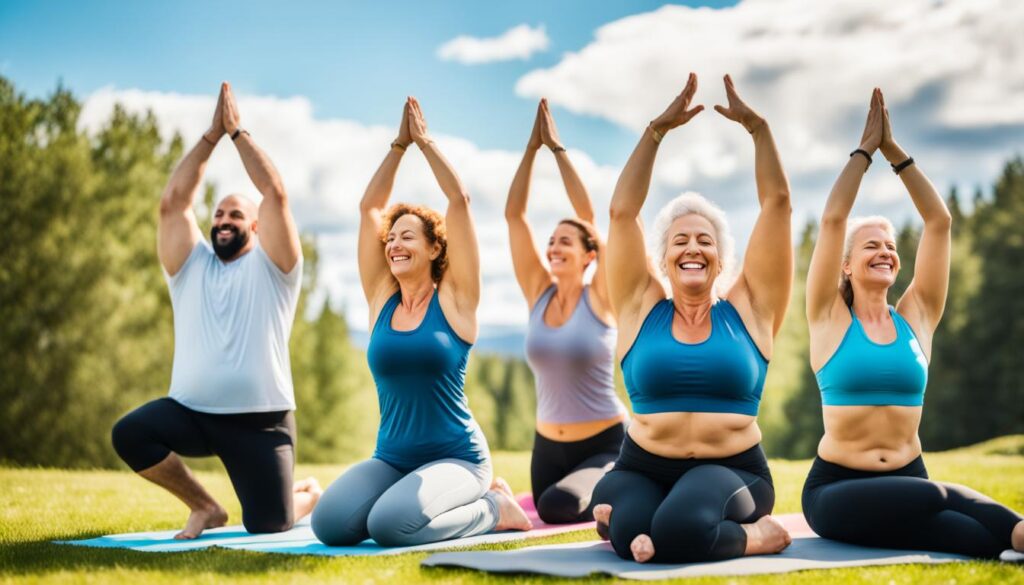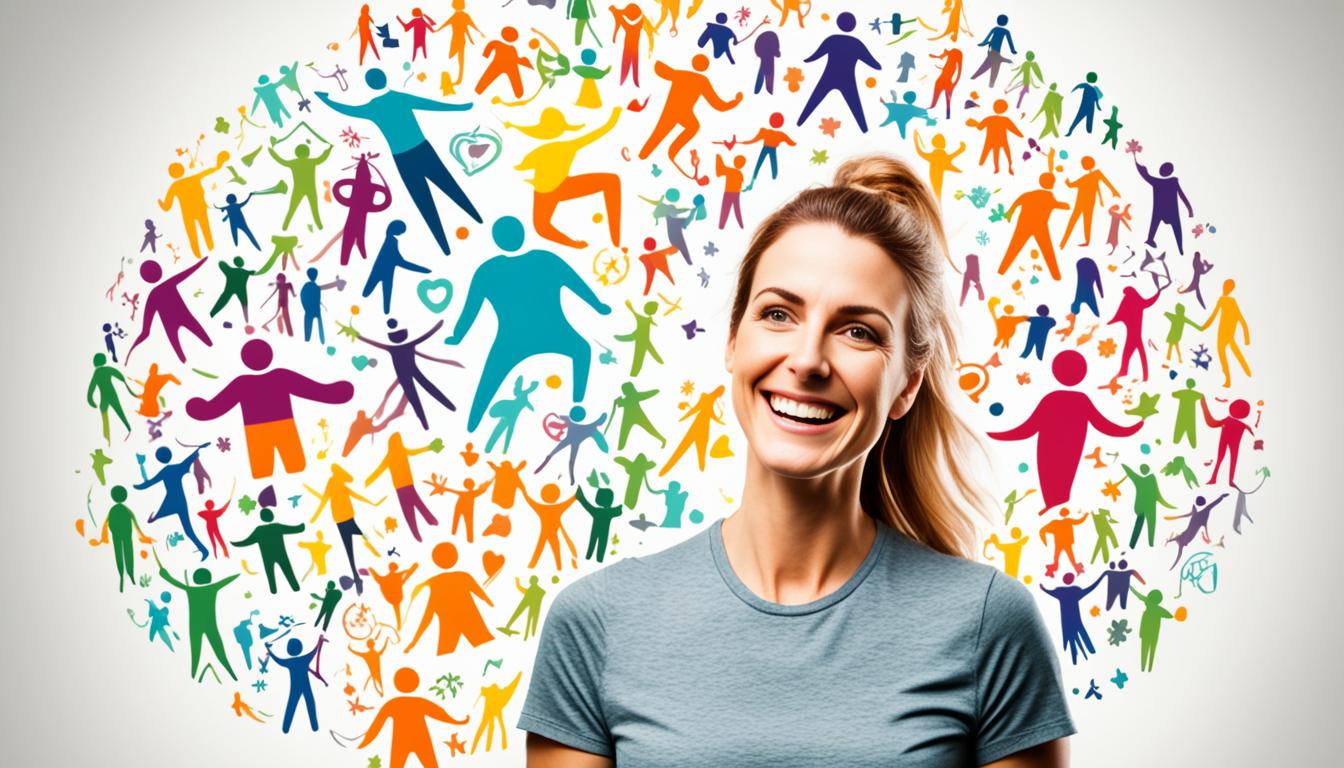Did you know that doing yoga and other exercises can really help your mental health? It can even help with serious mental issues like schizophrenia1?
Support groups are key to getting better mental and physical health for those with serious mental illnesses. In the UK, people with these illnesses die at a rate two to three times higher than others. This shows we really need strong support systems2. Studies have found that being active can make you healthier, lowering heart disease risk and helping manage diabetes2.
Groups that support each other through fitness are great for mental health. For instance, USC-MHS offers training and resources to help mental health in sports groups3. These efforts help people recover from mental health issues and build a sense of community. Joining group classes and talking with others can make you feel more in control of your health.
It’s important to mix mental health support with fitness groups. This helps everyone stay mentally well and builds strong, healthy communities.
Building a Supportive Fitness Network for Mental Health
Creating a strong fitness network for mental health is key, especially for those who find it hard to stay active. Such networks boost well-being by offering peer support, a safe space, and local resources. Here’s how:
The Role of Peer Support Groups
Peer support groups are vital for mental health and fitness. They offer social support and a sense of belonging, making people more likely to stay active. The American Psychological Association’s 2022 Stress in America survey found many people wanted more emotional support during the pandemic4.
Group workouts and social events can help build connections and a community feeling among clients5. Trainers with certifications from trusted groups like NASM, ACE, or ISSA are more likely to help clients succeed6.
Importance of a Non-Judgmental Space
A place without judgment is crucial for sharing experiences and getting support without shame. Training staff to be more sensitive can make a diverse group feel understood and valued5. Not having enough social support can raise the risk of serious health problems4.
So, a supportive fitness space can really help those dealing with mental health issues.
Utilizing Local Resources and Services
Using local wellness services can help people find activities they like. Personal trainers can create workout plans that meet specific goals, like losing weight or building muscle strength6. Many people say support systems reduce stress and improve their health and happiness4.
Custom fitness plans can make people feel more involved and empowered. This shows how local services can bring positive changes to communities5.
Group Fitness Classes That Prioritize Mental Wellness
Group fitness classes combine physical exercise, mindfulness, and social interaction. They help improve mental health, making you feel better physically and emotionally.
The Benefits of Structured Activities
Structured group fitness is more than just working out. It’s about building a community that supports your mental health. Studies show that joining fitness classes can lower stress, anxiety, and depression7.
For instance, the J in St. Louis offers over 200 free classes weekly, making fitness easy to access and boosting mental health7. Therapist-led classes mix exercises with group talks, helping people grow mentally and personally8.

Incorporating Mindfulness and Yoga
Mindfulness and yoga are key parts of these fitness programs. Adding yoga to your routine can make a big difference in your mental health, like reducing stress and boosting well-being. Classes are open to various groups, ensuring everyone feels included8.
People who try these classes see big improvements in their mental health. This shows how effective mindfulness and yoga can be in group settings8. These activities are easy to get into and help everyone grow, both as individuals and together.
These classes focus on building connections, hope, identity, meaning, and empowerment. This approach helps with recovery and well-being, showing how important community is for mental health.
Online Communities for Mental Health and Fitness Support
In today’s world, online fitness support communities are key. They help people feel connected even when they’re far apart. These groups offer easy access and privacy, letting people get help without worrying about location.

Advantages of Virtual Peer Support
Virtual peer support is always there, offering help that fits your life. Sites like Support Groups Central have groups for many issues, from depression to COVID-199. The Dinner Party helps young adults deal with loss, both in person and online9. These groups act like a safety net, helping people stay fit and mentally strong.
Accessible Resources for Health and Wellness
Online, you can find lots of health and wellness tools. HealthyMindsPhilly.org gives quick, free mental health checks and 24/7 support for emergencies10. You can easily find advice, lessons, and forums online. Facebook has groups for many issues, like COVID-19 and police brutality, led by experts9. Using these sites can really change your life, making you feel better overall.
| Platform | Service | Specialty |
|---|---|---|
| Support Groups Central | Support groups provided by national organizations | Depression, addiction, LGBTQ+, COVID-19 |
| The Dinner Party | Support for 20-30-year-olds coping with loss | Virtual and physical gatherings |
| HealthyMindsPhilly.org | Mental health tools and resources | Quick screenings, 24/7 support |
The Benefits of Accountability Partners in Fitness and Mental Health
Having an accountability partner boosts your commitment and helps you reach your fitness goals. This is backed by the American Psychological Association11. It also improves your mental health by offering emotional support and motivation.
Working out with a partner increases your chances of hitting your fitness targets. Sharing your workout plans beforehand helps you stay on track and fight decision fatigue11. In fact, sharing your progress with others can boost your success rate to almost 65 percent12.
Regular check-ins are key in keeping you motivated and flexible in your fitness journey11. A study with 130 couples showed that both partners benefited from weight loss, even if only one was actively trying12.
“Celebrating milestones and recognizing minor victories along the fitness journey help to maintain high motivation levels” — American Psychological Association11.
There are many ways to stay in touch, from daily texts to weekly updates, which keeps the support flowing11. In groups like Peloton, partners stay connected with high-fives, texts, and sharing workouts11. For a strong partnership, it’s important to be supportive and honest about what you need and expect11.
Joining fitness programs like Kaia FIT’s cross-training or TRX suspension training can boost your strength and fitness level12. These programs also help with mental health, making them great for partners to work together.
| Program | Benefits |
|---|---|
| Kaia FIT Cross-Training | Weight loss, muscle toning, flexibility, injury prevention12 |
| TRX Suspension Training | Strength, power, endurance, mobility, stability12 |
| Kaia Dance | Fun workout experience, suitable for all ages and fitness levels12 |
| Running Programs | Enhanced speed, endurance, overall fitness12 |
Working with an accountability partner helps you stay on track in fitness and improves your mental health. By celebrating each other’s wins and offering steady support, partners can make great progress in their fitness journeys.
Community and Support in Fitness and Mental Health
Joining fitness and mental health groups has many social perks. Being in a group can boost your confidence and make you stronger13.
The Psychological Benefits of Social Interaction
Having a strong support network makes you feel better mentally and gives you a sense of belonging13. Fitness groups create a place for friendship, support, and motivation13. These groups help ease stress and anxiety, which is good for your mental and emotional health13. Plus, staying active can lessen anxiety and help you sleep better14. Getting teens to move more can also cut down on anxiety or depression, offering big mental support14.
Case Studies and Success Stories
Many stories from mental health groups show how being active with others helps. Joining sports builds a sense of belonging and social ties important for mental health14. Having a workout buddy makes you more likely to stick with it, helping you stay active13. Being in a supportive fitness group where everyone cheers each other on can also lower stress and loneliness13. These stories show how fitness programs and social support can greatly improve both your mental and physical health.
| Aspect | Beneficial Outcomes |
|---|---|
| Support Network | Improved mental well-being and sense of belonging13 |
| Group Exercises | Increased self-confidence and resilience13 |
| Sports Participation | Fosters a sense of social connection vital for mental health14 |
| Physical Activity | Reduces anxiety, improves sleep quality, aids in emotional health14 |
Conclusion
Community support is key to better mental health and staying healthy. Fitness and mental health work together well. This means we need to keep in touch and use resources to feel good overall. Studies show that having friends can make you 25% more likely to keep exercising, helping your mental health15. Also, having strong friends can help you meet your fitness goals by 50%15.
Being part of group fitness classes, online groups, or support groups is very valuable. Working out with others can make you stick to your routine 30% more and lower stress and anxiety by 40%15. Using online tools and joining local groups helps make a space for both body and mind health.
Keeping up with a healthy lifestyle with the help of others is key for good mental health. Being in groups and having someone to answer to can boost your performance by 15-20% and cut down on missing workouts by 35%15. By using these methods, you can greatly improve your life, your mental health, and build a supportive community.



